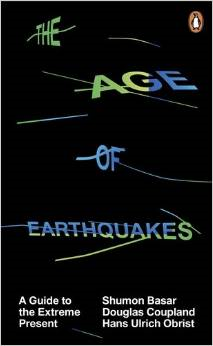The Age of Earthquakes: A Guide to the Extreme Present by
Shumon Basar, Douglas Coupland and Hans Ulrich Obrist is a Marshall McLuhan
influenced piece of cultural study. This newly published Penguin paperback seeks
to examine where we are now, where we are going and what the impact of the
digital revolution is on our earth, our society and our overall being. The
central thesis of this book being there is no part of our lives and indeed our
being that is not being impacted by the rise of technology we have been
witnessing over the last couple of decades.
The design of the book is in many ways signature Coupland
and that is strangely comforting, as is the fact it's an affordable little Penguin
which you can initially get through in one sitting.
There is humour in here such as the poster style double
page "Protect me from Amazon suggests I want". However, that humour
is always thought provoking and challenging. This book invites us to think
about both the world around us and the
world within us. It asks us to hit the pause button and think about the
philosophical and practical implications of the lives we are living. It also
has a theological aspect as it asks "what about the soul".
For those wanting to think about the theological implications
further I would signpost you to the work of the CODEC team up in Durham whose research is in this
area.
One quirky aspect of this book is it includes a set of
new terms which seek to encompass some of the contradictions we are
experiencing but have no language to express. My personal favourite is
"smupid" which refers to the way we're smarter than we've ever been
but we feel more stupid than ever before. The Guardian had an article giving an extract providing a glossary of some of the terms used.
This book would act as a good set of discussion starters
for a small group of people who are digitally literate. The wide range of sub-themes
it includes are varied and go from how we will like things on social media but
we don't vote to how the wiring of our brains is changing from taking a linear
format to a lattice format. My favourite question is "How do you use
yourself as an app?" It seeks to identify our individuality yet the book
also questions whether the individual or the mob will win the battle going on
at the moment.
The book is one I would certainly recommend to people who
want to be challenged to think and to have a laugh. It doesn't give answers as
such, rather it raises questions and gives possibilities.
To me it made it a
much more engaging book than Digital Vertigo by Andrew Keen which isn't bad and
covered some of the same ground but did so in a far more long winded and
slightly less entertaining way.
Vice Media has an interesting interview with the authors
by Dean Kissick which is worth a look if you want to know more about what this
book is about.
The
Age of Earthquakes: A Guide to the Extreme Present by Shumon Basar, Douglas
Coupland and Hans Ulrich Obrist, 2015, Penguin Books, ISBN 978-0-141-97956-4


No comments:
Post a Comment